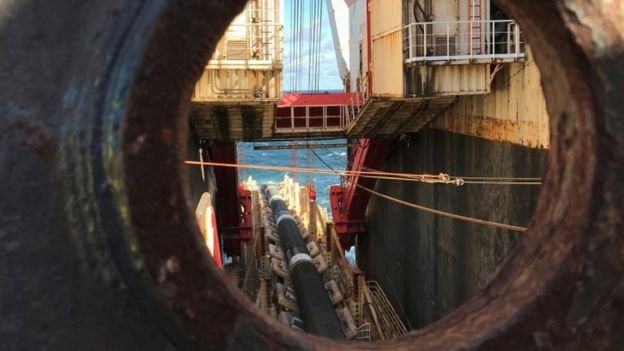
This article is more than
6 year old
The sanctions target firms building Nord Stream 2, an undersea pipeline that will allow Russia to increase gas exports to Germany.
The US considers the project a security risk to Europe.
Congress voted through the sanctions as part of a defence bill last week.
The bill, which described the pipeline as a "tool of coercion", was signed off by Mr Trump on Friday.
The almost $11bn (£8.4bn) Nord Stream 2 project has infuriated the US, with both Republican and Democratic lawmakers opposing it.
The Trump administration fears the pipeline will tighten Russia's grip over Europe's energy supply and reduce its own share of the lucrative European market for American liquefied natural gas.
President Trump has said the 1,225km (760-mile) pipeline, owned by Russia's Gazprom, could turn Germany into a "hostage of Russia".
The US sanctions have angered Russia and the European Union, which says it should be able to decide its own energy policies.
Earlier this week German Chancellor Angela Merkel said she was "opposed to extraterritorial sanctions" against the Nord Stream 2 project.

German foreign minister Heiko Maas struck a more combative tone, saying the sanctions amounted to "interference in autonomous decisions taken in Europe".
Allseas, a Swiss-Dutch company involved in the project, said it had suspended its pipe-laying activities in anticipation of the sanctions.
The US sanctions also target TurkStream, a Russia-Turkey pipeline, and include asset freezes and revocation of US visas for the contractors.
For years EU member states have been concerned about the bloc's reliance on Russian gas.
Russia currently supplies about 40% of the EU's gas supplies - just ahead of Norway, which is not in the EU but takes part in its single market. The new pipeline will increase the amount of gas going under the Baltic to 55 billion cubic metres per year.
Disagreements among EU nations were so strong that, earlier this year, they even threatened to derail the project entirely.

The bloc eventually agreed to strengthen regulations against Nord Stream 2, rather than stop it completely, and to bring it under European control.
Businesses in Germany, meanwhile, have invested heavily in the project. Chancellor Merkel has tried to assure Central and Eastern European states that the pipeline would not make Germany reliant on Russia for energy.
There is concern in other quarters, too. In May, climate activists opposing the use of fossil fuels occupied part of the Nord Stream 2 gas pipeline in Germany.
The demonstrators, who said the project would be more detrimental to the environment than the authorities had claimed, began skateboarding inside the pipes.
Police said at least five people had occupied the pipes near Wrangelsburg in northern Germany.